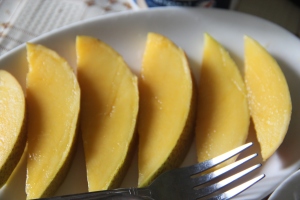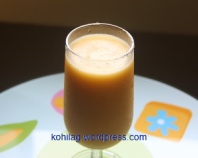Mango is a super food. A good snack. It is a versatile fruit that is high in Vitamin C, Vitamin B6, Vitamin A, potassium, and copper.
Do you know that mangoes decrease the risk of obesity and diabetes? It is true that ripe mangoes are high in sugars, and have a High GI. But this does not mean that diabetics and weight watchers should be banned from having it. It can, always be combined, with a low GI food to reduce the GI and balance the calories! The total amount of carbohydrates affects blood sugar levels more than does the source of carbohydrate or starch or sugar. 1/2 cup (85 grams) cubed mango contains about 15 grams of carbohydrate (60 calories).
One half of a small mango is a good source of both soluble (1.7g) and insoluble fibers (1.2g). Soluble fiber helps prevent cholesterol absorption and insoluble fibers help bowel movements and get rid of constipation.
How about having a mango, cucumber salad, for dinner. Cucumber is very low in calorie and GI too! Sounds good….
The antioxidant zeaxanthin, in mangoes, plays a protective role in eye health that ward off damage from macular degeneration.
Mangoes are rich in Beta carotene. β (beta)-carotene, a pro-vitamin A. According to the study by Harvard School of Public Health, beta-carotene plays major role against preventing the prostate cancer. β–carotene is converted to vitamin A, an essential nutrient. It has antioxidant activity, that helps protect cells from damage. Being an important flavonoid compound, β–carotene has powerful antioxidant functions, helps scavenge free radicals, there by limiting the damage to cell membranes, DNA and protein structures in the cell. High dietary intake of β-carotene
Sweet potato, brussel sprouts, carrots, kale, turnip greens, spinach mustard greens, carrots, butternut squash, collards, swiss chard, lettuce, apricots, guava, papaya, watermelon, basil, cilantro, parsley, thyme, pistachios are also good sources of β-carotene.
It is also a good source of Vitamin C and Vitamin E. Vitamin C helps scavange harmful free radicals. The vitamin B6 or pyridoxine in mangoes, help control homocystiene in the blood, which is harmful to blood vessels, resulting in stroke. Along with Vitamin C, β-carotene, is found to increase lung capacity and relieve respiratory problems, as well as protect from asthma, bronchitis.
Copper, a co-factor for many vital enzymes, is found in moderate amount in mangoes. Copper is also required for the production of red blood cells.
Mango peel is rich in phytonutrients, too!
Mango fruit-Nutrition Value per 100 g
(Source: USDA National Nutrient data base)
|
Principle |
Nutrient Value |
Percentage of RDA |
|---|---|---|
| Energy | 70 Kcal | 3.5% |
| Carbohydrates | 17 g | 13% |
| Protein | 0.5 g | 1% |
| Total Fat | 0.27 g | 1% |
| Cholesterol | 0 mg | 0% |
| Dietary Fiber | 1.80 g | 4.5% |
|
Vitamins |
||
| Folates | 14 µg | 3.5% |
| Niacin | 0.584 mg | 3.5% |
| Pantothenic acid | 0.160 mg | 1% |
| Pyridoxine (Vit B-6) | 0.134 mg | 10% |
| Riboflavin | 0.057 mg | 4% |
| Thiamin | 0.058 mg | 5% |
| Vitamin C | 27.7 mg | 46% |
| Vitamin A | 765 IU | 25.5% |
| Vitamin E | 1.12 mg | 7.5% |
| Vitamin K | 4.2 µg | 3.5% |
|
Electrolytes |
||
| Sodium | 2 mg | 0% |
| Potassium | 156 mg | 3% |
|
Minerals |
||
| Calcium | 10 mg | 1% |
| Copper | 0.110 mg | 12% |
| Iron | 0.13 mg | 1.5% |
| Magnesium | 9 mg | 2% |
| Manganese | 0.027 mg | 1% |
| Zinc | 0.04 mg | 0% |
|
Phyto-nutrients |
||
| Carotene-β | 445 µg | — |
| Carotene-α | 17 µg | — |
| Crypto-xanthin-β | 11 µg | — |
| Lutein-zeaxanthin | 0 µg | — |
| Lycopene | 0 µg | — |
Mango, the king of fruits!
Enjoy this wonderful fruit by adding it to salsa, smoothies and salads. Its sweet flavour make it an excellent ingredients in pies and muffins!
Moderation is the key. 1/2 cup (85 g) cubed mango – 60 calories.
Fruits and vegetables are good sources of vitamins and minerals that are associated with a reduced risk of many lifestyle – related health conditions.
Focus on a balanced diet and regular physical activity to maintain a good health.
References:

